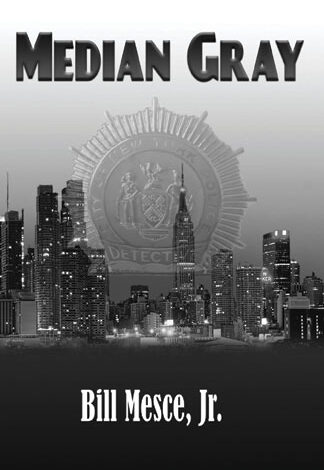Professor still finds time in busy life to write novels

LINDEN, NJ — Sometimes, being an author isn’t all it’s cracked up to be, and sometimes it is. Overall though Bill Mesce Jr. seems to have enjoyed himself so far.
“I think at the end of the year it’ll be 31 books,” Mesce said in a recent interview with LocalSource, regarding the number of books he’s written. “And I’m working on Elijah’s second book. Some of these are based on screenplays that did really well in competition, but nothing ever happened to them. You can’t always translate a screenplay into prose, but some of them work.”
The Elijah to whom he’s referring is Elijah Bone, a pseudonym he used when writing “The Golem Project,” a science fiction novel he released in May. “‘The Golem Project’ is a 1950s monster movie,” said Mesce, adding he’s considering a sequel.
Born and raised in New Jersey, Mesce spent his undergrad years at the University of South Carolina, but admitted, after moving away from the Garden State, it didn’t take long to start missing it.
As for how he wound up in Linden, Mesce said, “We moved here in 1997, when my wife was pregnant with our first daughter. We were living up in Bloomfield at the time in an apartment and we realized a baby’s coming along, so we should live in a house. We love it. It’s been good to us.”
Writing has been something he’s done for most of his life, when he wasn’t teaching or working at HBO.
“I worked at HBO for 27 years, then I got a job eliminated and started teaching in 2010,” said Mesce. “When I was still at HBO, I started in for my master’s at Montclair State. When I lost my job at HBO, I went to Fairleigh Dickinson for an MFA. I was trying to build up enough credentials to be a full-time professor. As adjunct, you put together a patchwork quilt of a schedule. There have been times where I’ve taught five schools at the same time.”
Teaching for hom has been an adventure, in and of itself, and often a sporadic one.
“The only time I was ever able to get a full time teaching gig was up in Maine in a small campus called the University at Farmington,” he said.
Writing didn’t necessarily come quickly for him either.
“It took me a while to get a handle on prose,” said Mesce. “I started with prose. My first novel, ‘The Advocate,’ I worked on it for 20 some-odd years and I stopped counting the rejections at 150. I don’t recommend it for anyone. I have a footlocker full of drafts of my first novel. The same thing with academic writing, I figured it out.”
He did, however, eventually find success, in World War II, of all places.
“The first three novels I did were all set in World War II, in Europe, although my main character was from New Jersey. He was an Army lawyer,” said Mesce. “The amount of homework I had to do… I got to take a trip to England and walking the ground really changed how I wrote it. You don’t get a feel for the place unless you’re there. The draft that I did after that was the one that got me the publishing deal.”
Success proved a mixed bag for him.
“Bantam was very supportive and they paid. They only wanted me to do one thing, these World War II novels. By the third one, not only was I burning out, but I had a huge creative disagreement. I was really fried.”
It wasn’t all bad though, he admits. “I’ve gotten to write whatever I’ve wanted, and get it published.
“Those three World War II novels are still in print. The first one came out in 2000. I’m shocked that people are still buying them. That thing is out there. It amazes me.”
Not doing strictly World War II novels has led to varying degrees of success, and required Mesce to become more dependent on his teaching, but he says that’s not necessarily a bad thing.
“The good thing that happened to me not living at Bantam is I had to live a life like everyone else. When I wrote the last World War II novel, at that time, I’d had both of my daughters. A friend read it and told me they could tell that I was a parent. I was writing about fathers and sons and what it feels like to lose them. If I had become a big success, I would not have had a regular life. If I had become a young success, it would have been the worst thing for me.”
Not surprisingly, when he’s working as a professor, Mesce often teaches various types of writing.
“Altogether, I’ve taught about a dozen schools, but Kean is my anchor,” he said. “They’re also the only school I get to teach creative writing. My duals are public speaking. Business writing, every once in a while, a media course.
“But Kean is the only one that gives me creative media courses.
“When I’m teaching character writing, I teach that you can’t write a character smarter than you. My editor at Bantam used to tell me, ‘I’m not a plot guy, I’m a character guy.’ When I had to do a mystery, it amazes me, it was a brainsprain for me to do it.”
New Jersey often figures strongly in his writing, he admits, although other places he’s lived have figured into his writing as well.
“I did a cop novel, ‘Median Gray,’ set in Manhattan, reliving the experience I had in Manhattan in the early ’80s. All the main character experiences are something I experienced.
“‘Four Days to Trinity,’ I simply moved from South Carolina to Texas. It was all with the prism of New Jersey.”
He had some special help for that book.
“Sonny Grosso was a huge help on ‘Medium Gray,’” he said. “Sonny Grosso, who was in ‘The French Connection,’ based off of his life.
“I did a novel called ‘Dante’s Paradise,’ about a forensics psychologist in Manhattan, and someone said I really hope he comes back and I couldn’t imagine how I’d bring him back.”
In addition to works of fiction, Mesce also writes academic pieces as well.
“Most of the academic books I’ve done, I’ve done through the same academic publisher. One was the history of HBO, one was about screenwriting. They let me be more personal, as long as I followed the rules: footnotes, academic notes.
“Having that credibility helps get you into the door, but going for my master’s taught me how to write academically.
“What I found with academic writing is it’s just another voice. This has to sound professorial,” he said. “I’ve gotten to write more different things. My second kids picture book will be coming out in December.”
Another area he explored was screenplays.
“I’ve done about 2 dozen screenwriting gigs, but only five actually made it to film and only one with my name: ‘Road Ends.’
“I’ve learned a lot about film, TV, publishing. So you write a screenplay that you think is really good.
“When I first started writing mystery romances or romance mysteries, I’m not sure. They are all written by women. So I adapted this name, Aja Holland. She has a facebook name and a write-in page.”
Another thrill Mesce has found is when students that he’s taught have found success themselves.
“I’ve gotten coming out of the spring semester, six different kids, I’ve gotten them their first stuff,” he said. “I got to tell you, it’s a buzz. I even do one whole class session on the business side.”
Mesce has even tried his hand at writing plays.
“I’ve written three plays that have been produced,” he said “I’ve always managed not to embarrass myself and I’ll call that a win. I’m not a theater guy, but I like to think I’m a good student. I can watch stuff and figure out how it works.
“I got a NJ State Council on the Arts grant.”
Mesce admits, “I am not a ‘write every day’ guy. If I don’t feel like it, I don’t do it. I go for a walk. I watch a movie. It’s all good advice as suggestions. It’s all bad advice as a rule.”
And he’ll always have teaching. But as the 2025-26 school year gets underway, he admits he’ll keep busy as a writer as well.
“Quantity-wise, I’m aware that I’ve done a lot,” said Mesce. “If I was going to write a memoir, it would be ‘Never a Success, But Not Quite a Failure.’
Photos Courtesy of Bill Mesce Jr.
Source link


